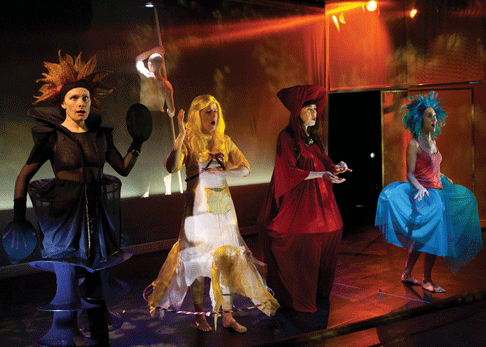Mosheh contains most of what we’ve come to expect from new
operas in the twenty-first century: video and film, of course, and also
gamelan-derived percussive scoring, surtitles to obviate the need for a
coherent drama, and naked male bodies, in this case the non-singing title role.
(Trivia: Name other title characters who do not sing in their own opera.
There’s La Muette de Portici, of course.)
What Mosheh has that I seldom expect is respectable melody.
Miriam’s serenade to her baby brother as she places him in the Nile is an
especially lovely number; Zipporah’s harsh aria about inventing
circumcision to save her new husband from the Angel of Death is less
immediately attractive. Too, the quartet at the conclusion of the opera when
the women narrate the twelve plagues that fall upon Egypt has an eerie harmony
that calls Benjamin Britten to mind.
What Mosheh, the opera, did not have was a coherent, stageworthy
way of telling its more or less familiar story. Without some Bible reading (or
a viewing of The Ten Commandments) and surtitles, I don’t think
an audience would find the action at all clear. It is rather a costumed series
of individual scenes, all for voices of too striking a sameness. Gal writes
well for the voice, without straining the instrument as the atonal opera
composers were prone to do—because, unlike them, he has not renounced
melody as an expressive tool—also, I suspect, he has studied voice
writing and respects the instrument and its capabilities. His four well-chosen
soloists had no trouble filling HERE’s admittedly small space with
thrilling sound that never made us wince.
But because the vocalism accompanied so little action and no dialogue, the
evening never became a dramatic event, that is, an opera. Were sets and
costumes (wild costumes!) even necessary? Were the tremendously elaborate and
often beautiful projections, which led us, for example, through rows upon rows
of columns into Pharaoh’s throne room, or beside the muddy pools of the
Nile required? Is Mosheh’s presence called for by the music, or would any naked
man (a volunteer from the audience, say) do just as well? Or could we dispense
with him too?
Soprano Hai-Ting Chinn, well known among fans of New York’s odder
opera scenes (she was the Wooster Group’s splendid Didone
Abbandonata), made the most striking impression here as Miriam, acting as
well as singing her lovely music.
John Yohalem
 Heather Green as Bitia, Beth Anne Hatton as Zipporah, Judith Barnes as Yocheved and Hai-Ting Chinn as Miriam [Photo by Hunter Canning courtesy of seven17 public relations]
Heather Green as Bitia, Beth Anne Hatton as Zipporah, Judith Barnes as Yocheved and Hai-Ting Chinn as Miriam [Photo by Hunter Canning courtesy of seven17 public relations]

